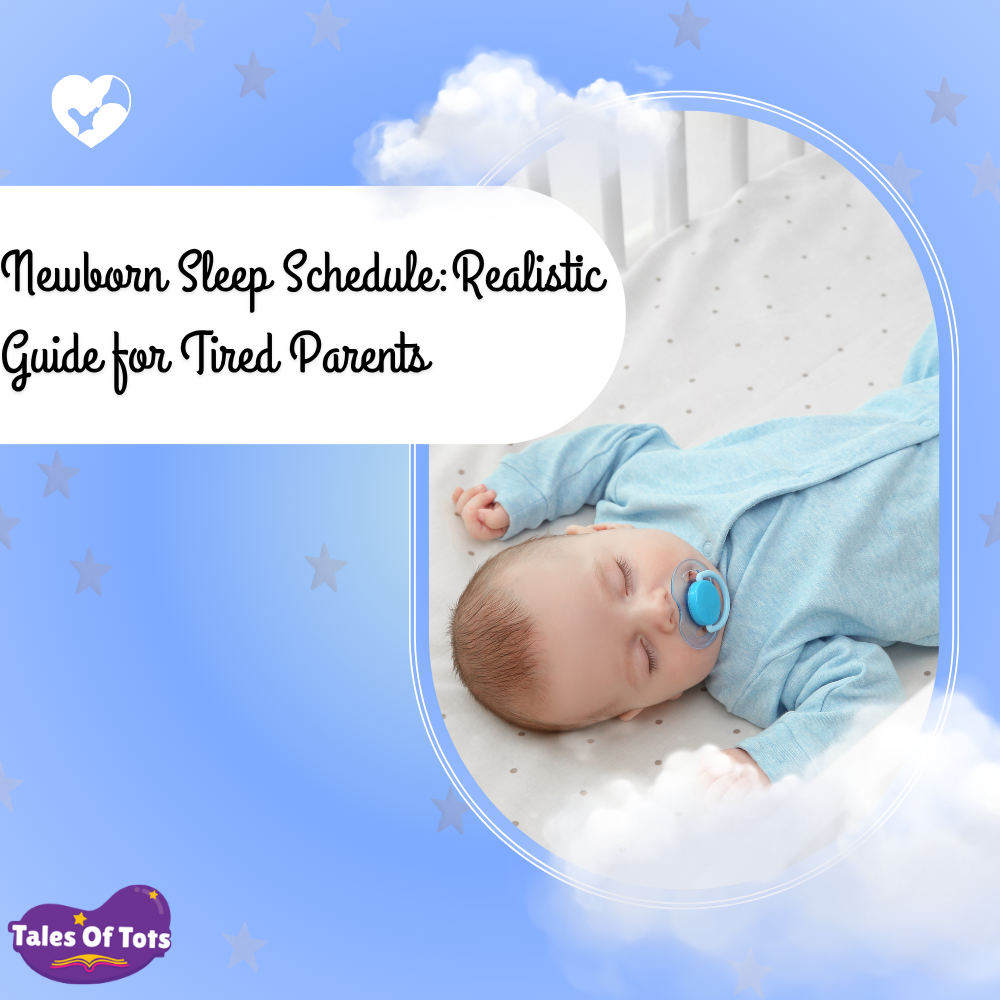By the Tales of Tots Team
Welcome to the whirlwind journey of parenthood! If you’re reading this, chances are you’re navigating the sleepless nights and unpredictable naps that come with caring for a newborn. Rest assured, you’re not alone. At Tales of Tots, we’re here to offer guidance, support, and a touch of humor as you adjust to life with your little one.
Understanding Newborn Sleep Patterns
Newborns have unique sleep needs that differ significantly from adults. In the first few months, babies typically sleep between 14 to 17 hours over a 24-hour period, often in short stretches of 2 to 4 hours. This fragmented sleep is due to their small stomachs requiring frequent feedings and their still-developing circadian rhythms.
It’s important to note that consistent sleep patterns usually begin to emerge around 3 to 4 months of age. Until then, flexibility and patience are key.
Week-by-Week Sleep Expectations
- Weeks 1–2: Sleep is evenly distributed between day and night. Naps are unpredictable, and babies wake frequently for feedings.
- Weeks 3–4: Slightly longer wakeful periods begin. Day/night confusion may persist.
- Weeks 5–6: Gradual development of circadian rhythms. Some longer nighttime sleep stretches may occur.
For a more detailed breakdown, consider visiting Huckleberry’s Newborn Sleep Guide.
Tips for Managing Newborn Sleep
- Follow Wake Windows: Newborns can typically stay awake for 45 to 60 minutes. Watching for sleep cues like yawning or fussiness can help you time naps effectively.
- Establish a Bedtime Routine: Simple activities like a warm bath or gentle lullabies can signal to your baby that it’s time to sleep.
- Differentiate Day and Night: Keep daytime interactions lively and nighttime environments calm and dimly lit to help your baby adjust their internal clock.
- Safe Sleep Practices: Always place your baby on their back to sleep on a firm mattress without soft bedding to reduce the risk of SIDS. For comprehensive guidelines, refer to the American Academy of Pediatrics.
Common Challenges and Solutions
Day/Night Confusion: If your baby is more active at night, try exposing them to natural light during the day and keeping nighttime feedings quiet and subdued.
Short Naps: It’s normal for newborns to take brief naps. Over time, these will lengthen as your baby’s sleep patterns mature.
Frequent Night Wakings: Regular nighttime awakenings are typical in the early months. Ensuring your baby is well-fed during the day can help reduce the frequency.
When to Seek Professional Advice
If your baby consistently has trouble sleeping, seems excessively fussy, or you’re concerned about their sleep habits, don’t hesitate to consult your pediatrician. They can provide personalized guidance and rule out any underlying issues.
Final Thoughts
Remember, every baby is unique, and what works for one may not work for another. The early months are a period of adjustment for both you and your baby. Be gentle with yourself, celebrate small victories, and know that restful nights are on the horizon.
For more parenting tips and support, explore our other articles at Tales of Tots.
Stay Connected
If you found this guide helpful, consider subscribing to our newsletter for more insights and tips on parenting. Join the Tales of Tots community and navigate the journey of parenthood together.
Disclaimer: This article is for informational purposes only and does not substitute professional medical advice. Always consult your pediatrician regarding your baby’s health and sleep concerns.



